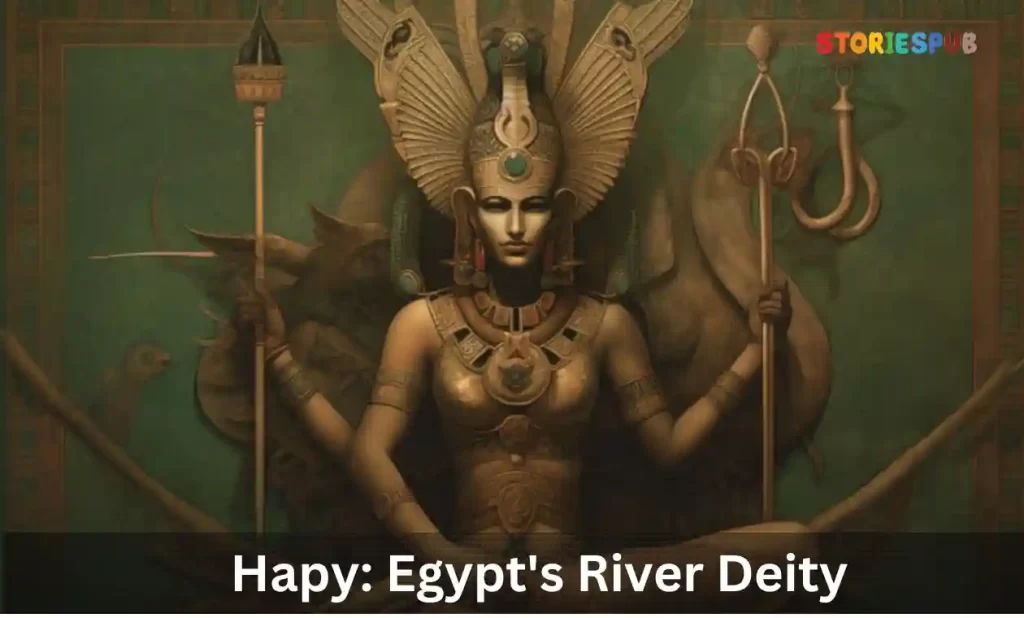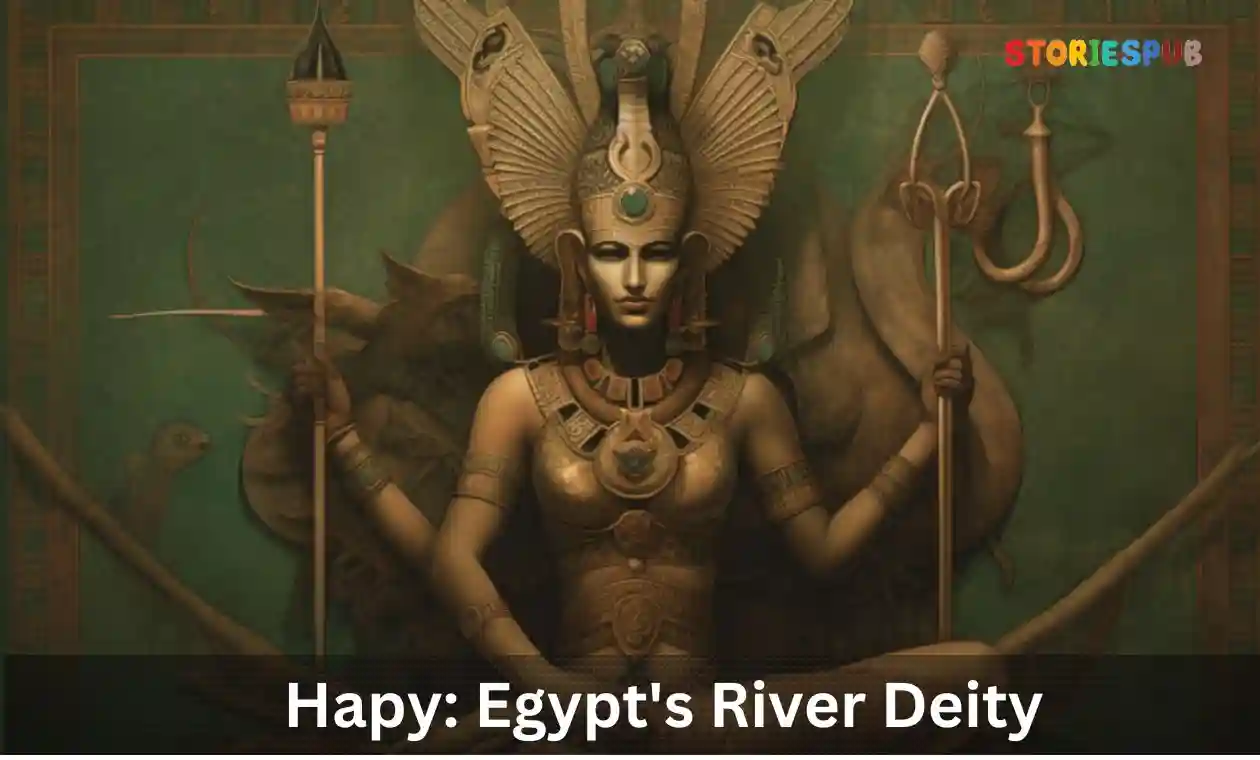Hapy: Egypt’s Nile River Deity

The Nile River and Ancient Egyptian Mythology
The ancient Egyptians revered the Nile River and considered it to be a source of life. It was the primary source of water for the civilization, providing them with fertile land for agriculture and fish for sustenance.
This made the Nile River an essential part of their belief system, inspiring myths about its creation and significance. The ancient Egyptians believed that their gods were responsible for creating everything in the world, including the Nile River.
They believed that Hapy, the god of fertility and inundation, was responsible for ensuring that the river flowed properly. They even went so far as to worship Hapy during festivals held in his honor.
The Legend of Hapy
Hapy was one of the most important gods in ancient Egypt. He personified the annual flooding of the Nile River which would bring rich silt deposits to fertilize crops along its banks. The god is depicted as a fat man with breasts symbolizing plenty.
According to legend, Hapy was responsible for controlling how much water flowed down from the mountains into Egypt’s network of canals and irrigation ditches. Without his guidance, crops would not grow properly, leading to famine across Egypt.
Hapy’s Role in Ancient Egypt
As mentioned earlier, Hapy’s role in ancient Egyptian society centered around ensuring that there was enough water flowing through their rivers to sustain their agricultural base. Without this essential resource, they would have faced droughts and famines that could have wiped out entire communities.
Hapy’s association with fertility went beyond just agriculture; he also played a key role in human fertility as well. Many couples prayed to him when seeking children or help with pregnancy issues.
Worshiping Hapy
Ancient Egyptians celebrated festivals dedicated specifically to honoring Hapy throughout each year . During these events they offered sacrifices and sang hymns to show their devotion to him.
Hapy was also regularly depicted in artwork, including statues and wall reliefs, as a way of paying homage to his importance in their lives. Egyptians believed that by representing Hapy in this way, they could ensure his continued good will towards them.
The Legacy of Hapy
Hapy’s legacy continues into modern times as people are still fascinated by his role in ancient Egyptian history. His presence is felt not only through art and literature but also through the Nile River itself. The river remains an integral part of life for those living in Egypt, just as it was during Hapy’s time.
As we look back on ancient Egyptian mythology, it becomes clear that understanding the role that gods like Hapy played is essential for understanding how their civilization functioned and thrived. By recognizing the significance of the Nile River and its connection to Hapy, we can gain a deeper appreciation for this fascinating culture and its place in human history.
The Background of Hapy
As one of the most important gods in ancient Egyptian mythology, Hapy was revered for his role in maintaining the fertility of the Nile River. To understand his significance, it is important to first understand why the Nile was so crucial to ancient Egyptians. The Nile River provided a vital source of water and nourishment for crops, making agriculture possible in an otherwise arid region.
As a result, the annual flooding of the Nile was seen as a miraculous event that brought life and prosperity. This flooding also deposited rich silt onto farmland along the riverbanks, further enhancing crop yields.
Hapy played a vital role in ensuring that these floods were both predictable and bountiful. According to mythological accounts, Hapy controlled not only the annual floodwaters but also all of Egypt’s water sources, including underground wells and springs.
Hapy’s Appearance and Characteristics
Depicted with a round belly and full breasts like those of a pregnant woman, Hapy’s physical appearance reflected his association with fertility. He was often depicted as having blue or green skin, representing both his control over water and his divine nature.
Hapy is also often shown holding two large jugs or sistrums filled with water or food offerings. These items symbolized his ability to provide sustenance for both people and animals alike.
In addition to being associated with fertility and abundance, Hapy was also considered a benevolent god who protected people from disasters such as droughts or famine. His kind-hearted nature made him popular among ancient Egyptians who sought his favor through offerings and prayers.
Overall, Hapy played an integral role in Egyptian society by ensuring that crops were plentiful each year through controlling the flooding of the Nile River. His appearance reflected his divine power over water while his kind-hearted nature endeared him to followers seeking protection from natural disasters.
The Birth and Childhood of Hapy, the God of the Nile River and Fertility
The Mythological Story of Hapy’s Birth
In ancient Egyptian mythology, Hapy was believed to be the son of Horus, the god of the sky, and Isis, the goddess of motherhood and fertility. According to legend, when Horus died in battle against Set, his body was cut into pieces and scattered across Egypt.
Isis searched for her husband’s body parts but could only find most of them. She then used her magical powers to create a replica of Horus’ phallus and impregnate herself with it.
Nine months later, she gave birth to Hapy. Hapy was born fully grown and already possessed great knowledge and wisdom as a god.
He was said to have been created from Horus’ semen which fertilized the banks of the Nile River. This link between his birthplace and his purpose as a god would later become an important part of his role in ancient Egyptian society.
Hapy’s Childhood and Education as a God
As one of the gods associated with fertility in ancient Egypt, Hapy had a unique upbringing that reflected this role. He was educated by other gods in topics such as agriculture, fishing techniques, irrigation systems, and general river management. His education also included topics such as weather patterns; he learned how floods can affect soil quality which impacts crop growth.
Hapy spent most of his childhood exploring everything around him including plants on land along with fish in water bodies like streams or lakes where he developed expertise with fisherman’s nets used during harvests. The Nile River flowed through Egypt bringing life-giving waters upon which depended all civilization’s prosperity; therefore understanding everything about this river happened naturally for him due to turning into an expert at it.
As he grew up into adolescence Hapi gained more responsibilities and became highly skilled in managing the river’s water level to ensure optimal conditions for agriculture. During this period, he also learned how to predict the annual flooding of the Nile River with great accuracy, which became an essential part of his role in ensuring bountiful harvests for the people of Egypt.
Throughout his education, Hapy developed strong bonds with other gods like Osiris (god of agriculture) and Isis (goddess of motherhood and fertility). These relationships would later play a critical role in his career as a god.
Hapy was always enthusiastic about helping others, even if it meant going out of his way to assist farmers or fishermen who were struggling to survive during difficult times. While being born under unique circumstances from another god’s body parts may seem unusual, Hapy quickly proved himself as a wise and intelligent God.
His upbringing allowed him to gain essential knowledge that he would later use to ensure the prosperity and fertility of the Nile River region. In the next sections we will discuss more on Hapi’s roles that would be significant throughout history even after ancient Egypt’s decline into obscurity.
Maintaining the fertility of the Nile River
Hapy was known as the god of the Nile River, and his primary responsibility was to ensure that it remained fertile. This task was vital for ancient Egyptians as their agriculture relied heavily on the annual flood cycle that occurred in the Nile River. Hapy was believed to control this flood cycle, which is why he was worshipped so fervently.
The floods would bring in nutrient-rich silt and water to irrigate crops, and it was said that Hapy controlled these floods with his powerful magic. He would travel up and down the river, ensuring that every corner of its banks received enough water and silt deposits to support crops.
It is believed that Hapy’s role in maintaining the fertility of the Nile River was so crucial that if he failed in his duties for even one year, droughts and famine would ravage Egypt. As a result, farmers paid great attention to Hapy’s worship, hoping for a good harvest every year.
Ensuring bountiful harvests for farmers
As mentioned above, Hapy’s role in maintaining a fertile Nile River directly affected farmers’ success or failure each year. Therefore, part of his duties included ensuring bountiful harvests for them. Hapy made sure that there were no pests or plagues affecting crops along with providing enough water through flooding required by crops at right times.
Farmers prayed to him during planting season as well as during harvesting season hoping he will bless them with an abundant yield because over two-thirds of Egyptian population worked on farmlands back then. Additionally, many temples had granaries where they stored grain from successful harvests; these granaries were often considered sacred spaces dedicated to Hapy since he played such an important role in agriculture.
Protecting fishermen and their livelihoods
Fishermen also relied heavily on Hapy as the Nile River was home to a vast array of fish species, which provided a significant food source for Egyptians. Hapy was also known as the god of fertility, and his influence extended beyond farmlands.
Hapy’s protection would not only benefit the fishermen but also their families who depended on them for their daily bread. Therefore, fishermen worshipped him with as much fervor as farmers did.
Fishermen would make offerings to Hapy at various points along the Nile River, hoping to appease him and gain his favor. It is said that Hapy protected not only fish but also other aquatic creatures from harmful predators or natural disasters like drought.
Hapy’s role in maintaining fertility in Nile river, ensuring bountiful harvests for farmers and protecting fishermenwas vital in ancient Egyptian society. His influence extended beyond these responsibilities; he was revered by all Egyptians and played an essential part in their religious beliefs and practices.
Worship and Festivals
Egyptians had a long-standing tradition of worshipping gods and goddesses, Hapy among them. Hapy was considered as one of the most important gods in ancient Egyptian mythology. He was believed to be the god of the Nile River and fertility.
The Nile River played a vital role in the life of ancient Egyptians, providing them with water for agricultural activities and other uses. As such, Hapy’s worship was critical to ensure that the Nile would continue to provide fertile soil for cultivation.
How Ancient Egyptians Worshipped Hapy
The worship of Hapy involved a range of rituals and practices that were conducted by priests or ordinary people seeking his blessings. Temples dedicated to him were constructed along the banks of the Nile River, where they could be seen by those who sailed its waters. Devotees would often offer prayers, food offerings, and flowers at these temples as a sign of their devotion.
Another way that ancient Egyptians worshipped Hapy was through the use of images or statues representing him. These statues would be placed inside temples or homes where they would be regularly decorated with garlands or other offerings as a token of respect.
Hymns and songs were composed about Hapy’s greatness in order to honor him further. These songs were sung during various festivals dedicated to him throughout the year.
Major Festivals Dedicated to Hapy Throughout the Year
Several festivals were celebrated throughout Egypt each year in honor of different deities; some specifically observed for Hapi include: – The Festival of Sokar: This festival took place on December 27th – January 1st each year at Memphis (the capital city during Old Kingdom) where it is believed that Sokar (a falcon-headed god) rejuvenated Osiris while he lay dead. – The Festival Of Osiris: This festival was held in Abydos every year, where the god’s sacred temple is located.
It would usually take place in March and April and would last ten days. It was believed that Osiris rose from the dead during this time, and so many people would come to the temple to witness his resurrection.
– The Festival Of The Valley: This festival took place in Luxor each year during May or June. It celebrated the return of Amun – King of Gods from his trip to visit the West Bank (where he visited the dead souls) to Luxor Temple.
These festivals were an opportunity for people to come together, offer prayers and sacrifices, and celebrate their devotion to Hapy. These celebrations also served as a way for people to connect with each other and feel a sense of community, reinforcing their faith in Hapy’s ability to provide for them through the Nile River’s fertility.
Relationships with Other Gods
Relationship with Osiris, god of agriculture
Hapy had an important relationship with Osiris, the god of agriculture. Both gods were responsible for the fertility of the land and the success of crops. Hapy was often depicted as pouring water from two vases onto Osiris’ feet, symbolizing his role in providing the necessary moisture for crops to grow.
In return, Osiris ensured that the land remained fertile and productive. In some myths, Hapy is identified as one of Osiris’ sons, further emphasizing their close relationship.
The two gods were also associated with resurrection and rebirth; Osiris was believed to have died and been resurrected each year, while Hapy’s floods brought new life to the land. Together, they ensured that Egypt remained a prosperous and bountiful nation.
Relationship with Isis, goddess of motherhood and fertility
Hapy also had a close relationship with Isis, the goddess of motherhood and fertility. Like Hapy, Isis was responsible for ensuring fertility and abundance in all aspects of life. In some myths, she was even considered to be Hapy’s wife or consort.
Together, Hapy and Isis played an important role in ensuring that crops grew successfully and families were able to have children. In artwork depicting these two gods together, they are often shown pouring water over fields or holding baskets filled with offerings from grateful farmers.
Isis was also closely associated with the Nile River; in fact, her tears were said to be what caused it to flood each year. Her connection to this important source of life made her an integral part of Egyptian mythology – just like Hapy himself.
The Importance of Harmonious Relationships Between Gods
The relationships between different gods in ancient Egyptian mythology were incredibly important – especially when it came to those like Hapy who were responsible for maintaining fertility and abundance. These gods relied on each other to ensure that the land remained productive and the people were well-fed.
In this way, the ancient Egyptians believed that their gods’ relationships with each other mirrored human relationships. Just as people needed to work together to achieve common goals, so too did the gods need to cooperate to ensure that their divine duties were fulfilled.
The Egyptians also believed that if any of these relationships were disrupted – for example, if a god became jealous or angry – it could have disastrous consequences for the land and its people. It was therefore incredibly important for all of the gods to maintain harmonious relationships with one another.
The Legacy of Hapy
Hapy’s legacy lived on long after ancient Egyptian mythology had faded into obscurity. In fact, his role as a symbol of fertility and abundance continued to be celebrated even in modern times. Many Egyptian-themed works of art feature images of Hapy pouring water over fields or holding baskets filled with fruits and vegetables.
His image has also been used in advertising campaigns for food products – such as fruit juice or cereal – which emphasize their natural origins. Today, we can still see the importance placed on fertility and abundance in our own society.
While we may not worship gods like Hapy anymore, we continue to value these qualities in our food sources and daily lives. The legacy of this ancient god lives on in ways we might not even realize – a testament to how enduring his influence truly is.
Legacy
The legacy of Hapy is one that has lasted for thousands of years, and had a profound impact on ancient Egyptian culture and society. As the god of the Nile River and fertility, Hapy was of utmost importance to the ancient Egyptians, whose very existence depended on the annual flooding and subsequent fertilization of their crops. Many aspects of daily life were affected by Hapy’s influence.
The Nile River was not only a source of water for drinking, bathing, and washing clothes, but also served as a major transportation route for goods and people. Fishermen relied on the river’s bounty for their livelihoods, while farmers looked to its seasonal floodwaters to nourish their crops.
In addition to his role in maintaining the fertility of the Nile River, Hapy was also associated with abundance and prosperity more broadly. He represented an ideal vision of Egypt as a land overflowing with natural resources that could provide for all its people’s needs.
Historical significance in ancient Egypt
Hapy played an important role in Egyptian mythology from early times up until the end of ancient Egyptian civilization itself. His image can be found on many artifacts from various historical periods throughout pharaonic history. The god’s link to agriculture made him particularly important during times when food shortages were common.
In fact, there are accounts of entire festivals dedicated to thanking Hapy for his provision during times when crops were especially plentiful. Hapy also played a significant role in funerary rites.
Many tombs contained images or depictions of Hapy holding up a symbol that represented eternal life or rebirth. This association with death likely stems from his connection to Osiris, god of resurrection who was often depicted as being reborn through the waters of the Nile.
Modern day influence
Though ancient Egyptian civilization has long since passed, the legacy of Hapy continues to influence modern-day culture in a variety of ways. For example, the Nile River remains a major source of life and prosperity for people living in Egypt and other countries through which it flows.
In addition, the mythology surrounding Hapy and other Egyptian gods continues to fascinate people around the world. Books, movies, and other forms of media often draw on ancient Egypt for inspiration, showcasing just how much this culture has left its mark on modern society.
Hapy’s association with fertility and abundance is still remembered by those who celebrate the harvest or engage in agricultural activities. In some cultures today, it is still common to offer prayers or thanks to deities associated with growth and fertility.
All in all, Hapy’s legacy stands as a testament to the enduring power of myth and religion. Though he may have been considered “just” a god by some during his time on Earth, his influence can still be felt thousands of years later.
Conclusion:
Hapy was a vital figure in ancient Egyptian mythology, as he played a crucial role in maintaining the fertility of the Nile River. His legacy has continued throughout history, as his name still resonates with people all over the world who are fascinated by ancient Egypt and its rich culture.
Summary of key points about Hapy:
As we have seen, Hapy was an important god in ancient Egypt responsible for ensuring that the Nile River remained fertile and bountiful. He was depicted as a jovial, robust man with water plants adorning his head. He was known to be a gentle deity who brought prosperity and joy to those who worshipped him.
The impact that he had on ancient Egyptian society:
The Nile River was essential to life in ancient Egypt and played an integral role in sustaining their civilization. As such, Hapy held great significance and importance throughout the society.
Farmers depended on him for agricultural success while fishermen saw him as their protector. The annual flooding of the river was believed to be caused by Hapy’s blessings.
Hapy’s influence extended beyond agriculture and fishing; he also played a part in religious ceremonies and festivals throughout the year. His presence could be felt everywhere in Egyptian society, from art to religion to everyday life.
How his legacy has continued into modern times:
Although ancient Egyptian mythology has faded into obscurity over time, Hapy still holds relevance today. People are fascinated by this god of fertility because he represents something fundamental about human existence: our connection to nature.
In modern times, we see echoes of Hapy’s influence reflected in art, literature, film, and popular culture worldwide. Many people continue to look back at ancient Egypt with awe and wonderment, recognizing how much we can learn from this remarkable civilization.
While it’s true that history can often feel distant and disconnected from our modern lives, Hapy is an example of how certain ideals are timeless. His legacy has continued into modern times because he represents something fundamental about humanity that will always endure: our deep relationship with the environment around us.
Hey kids, how much did you like Hapy: Egypt’s Nile River Deity ? Please share your view in the comment box. Also, please share this story with your friends on social media so they can also enjoy it, and for more such Egyptian Mythology, please bookmark storiespub.com.
Related Post :
Hapy FAQ
How is Hapy portrayed in ancient Egyptian art?
Hapy is typically portrayed as a pot-bellied man with aquatic plants on his head, symbolizing his connection to the Nile and fertility.
What role does Hapy play in the Egyptian pantheon?
As the god of the Nile and fertility, Hapy represents the life-giving waters of the Nile and the abundance it brought to ancient Egypt.
How was Hapy worshipped in ancient Egypt?
Hapy was worshipped through prayers, offerings, and dedicated temple rituals that celebrated the annual Nile flood, which brought fertility to the land.
Did Hapy have any specific animal associations?
Hapy was sometimes associated with crocodiles and hippopotamuses, which were seen as symbols of the Nile's power and fertility.
What is the meaning behind Hapy's name?
Hapy's name is derived from the Egyptian word "hep," which means "to run," symbolizing the running waters of the Nile River.
Is Hapy mentioned in ancient Egyptian texts?
Yes, Hapy is mentioned in various texts, including the Pyramid Texts and the Book of the Dead, as a provider of fertility and abundance.
How is Hapy related to other gods in Egyptian mythology?
Hapy is sometimes linked to other fertility gods like Osiris and Min, as well as Nile-related deities like Sobek and Khnum.
Were there any major temples dedicated to Hapy?
Although there were no major temples solely dedicated to Hapy, his worship was integrated into temples dedicated to other gods in ancient Egypt.
How has Hapy's symbolism influenced modern culture?
Hapy's role as a fertility god and his connection to the Nile River have inspired various art forms, literature, and studies of ancient Egyptian mythology.
























